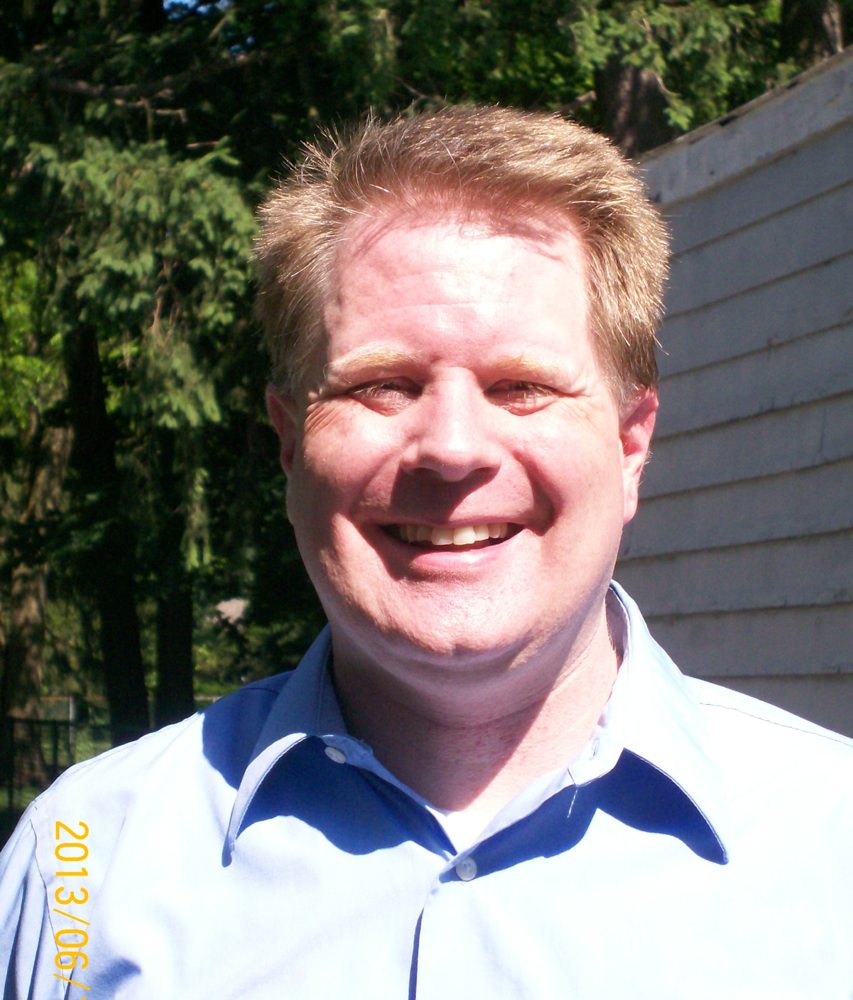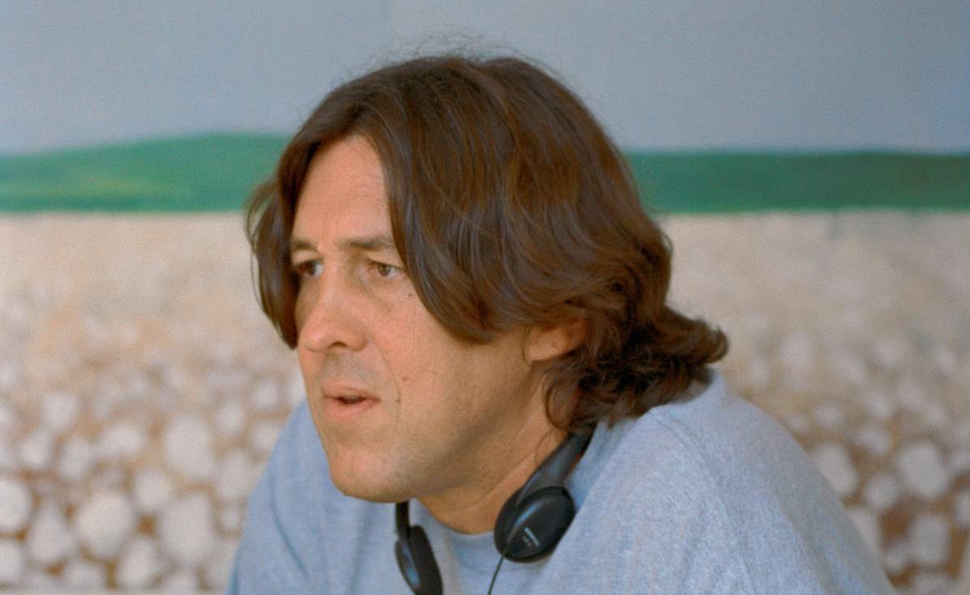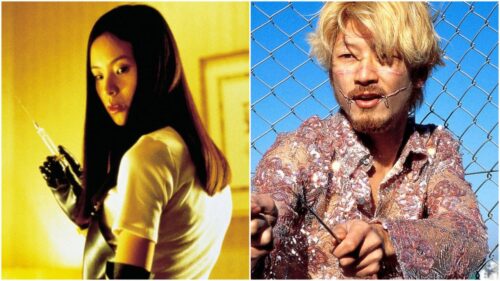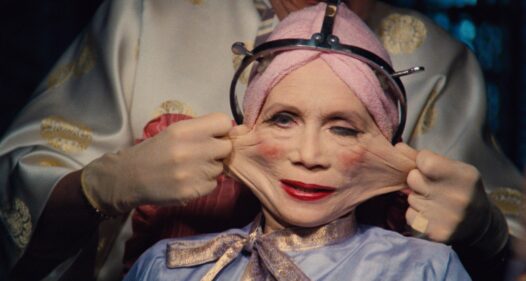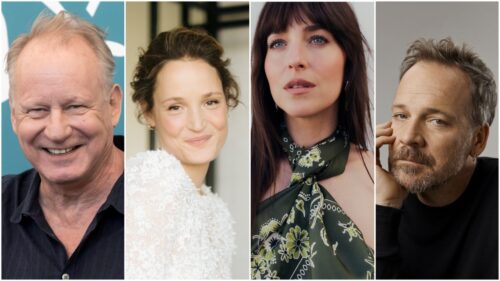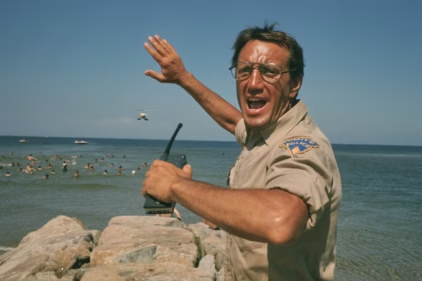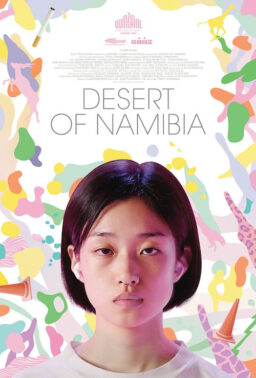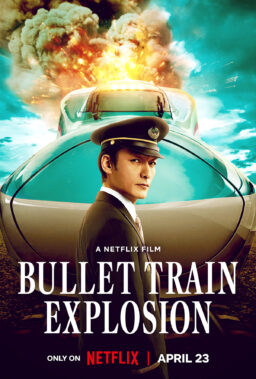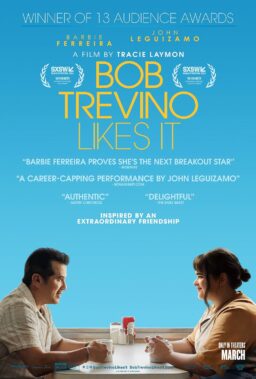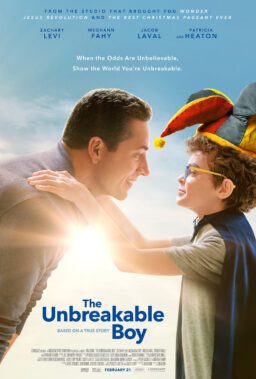From
Lloyd Dobler (John Cusack) blasting “In Your Eyes” outside the window
of girlfriend Diane (Ione Skye), in “Say Anything…” (1989), to
playboy David Aames (Tom Cruise), running in a daze through an empty Times
Square, in “Vanilla Sky” (2001), Cameron Crowe’s body of work plays
in the memory as a set of scenes and images, like pop singles spinning off a
hit album. These images have certain
elements in common: movie stars, longing, a search for some sense of community
(even in a Manhattan dreamscape). They reinforce Crowe’s interest in human
faces (close-ups are like a chorus he’s constantly returning to for emotional
reinforcement), display his adept deployment of pop music, and extend Crowe’s
reputation as a middlebrow humanist, the quintessential Nice Guy of
contemporary Hollywood.
Despite
writing the book and screenplay of “Fast Times At Ridgemont High”
(1982), the film that established the parameters of ’80s teen movies; despite establishing or
redefining a host of contemporary film stars; despite major box office success,
despite an Oscar, despite his role as a pop music shaman—there’s little written
about Crowe’s work as a writer and director. There’s nothing immediately flashy
in Crowe’s visual style, few of the references-on-the-sleeve that act like
catnip to critics in search of click-bait. The consensus on much of Crowe’s
work seems to follow a line from Stephen Sondheim’s “Into The Woods,”
where it’s framed as the ultimate putdown: “You’re not good, you’re not
bad/You’re just nice.” But
this definition of Crowe as simply a “nice guy” is wrong, at least when
it comes to the work. Critics would be better served by the clear eye of Linda
(Kyra Sedgwick), deconstructing the “everyday guy” persona of Steve (Campbell
Scott) in “Singles” (1992): “I think that, a) you have an act, and
that, b) not having an act is your act.” Or, as Lester Bangs (Philip Seymour
Hoffman) says to young William in “Almost Famous,” “The only true
currency in this bankrupt world is what you share with someone when you are
uncool.”
Crowe’s work is really that of a wary optimist, a humanist
in a postmodern age. On the eve of his latest film, “Aloha,” I wanted to
explore this ambivalent perspective, tracing Crowe’s cinematic body from
adolescence to middle age (and back again), when the line between
“cool” and “uncool” fades into something richer, more
creative, and possibly tinged with grace.

“Say
Anything…” (1989)
The
trick of “Say Anything….” is that it doesn’t believe in the boom-box
myth.
Lloyd
holding up a boom-box playing Peter Gabriel has become a defining images for
Generation X. It’s a moment that works primarily because of the pained earnestness
on John Cusack’s face. But “Say Anything…” knows that, however much
you are transported for that moment, the real work occurs in the fuzzy spaces
in between tracks on the mix; much of the film is about deconstructing the
myths of love—romantic, familial, communal—and finding the honesty
underneath. Diane’s perfect-student exterior masks uncertainty about her
future; her father’s business-like facade masks an IRS scam; Lloyd’s
friends—from the losers hanging at the gas station to Lilli Taylor’s Corey
(“I’ve written 63 songs about Joe…I’m going to play them all
tonight“)—mask their insecurities with bravado. Only Lloyd tries to tell
the truth at all times, but he can’t. When words fail, he hides behind
Gabriel’s paean to then-girlfriend Rosanna Arquette.
It’s
why that dollying close-up of Lloyd is important—it’s not a look of
infatuation, but one of pain, as Lloyd tries hard to let his face go blank like
Garbo, to let the music talk for him. But he can’t quite pull it off—at one
point, Lloyd’s eyes flinch, flashing a bit of puppy-dog desire, and he tries to
cover by tilting his chin up with rock star defiance. That might have been a
nod to both Billy Idol (whose “To Be A Lover” was what Crowe had
imagined would be playing when he wrote the scene), and some of Cusack’s own
dislike of the moment: Crowe says the actor resisted the scene, feeling Lloyd
was being too “subservient” to Diane by coming over with the box: “I wanted to just have the boom-box be on top of the car and
him sitting on the roof,” Cusack said. “So I finally did it, but I
did it without a look of longing and adoration and love. It was a different
kind of feel than either one of us had originally planned.”

“We
Bought A Zoo” (2011)
Crowe
told “Entertainment Weekly” that he was inspired to use “Eyes”
for “Anything” because it was in his wedding—listening to an “I
Do” cassette he’d made, the song came on, and the rest was history. Crowe
would return to these themes of love, loss, and family with “We Bought A
Zoo.” It’s an anecdotal children’s film, and that’s not an insult; in
fact, Caryn James’ description of “Say Anything…”—that it “resembles a first-rate production of a children’s story,” but
one whose melodrama “distorts that perspective…The film is all charming
performances and grace notes” is actually a fairly apt description of
“Zoo.” When Diane returns to Lloyd in “Say Anything…,” he
asks, “Because you need someone, or because you need me?…Forget
it. I don’t care.” “Zoo” is about what happens to that kind of
couple down the line.
Matt
Damon plays journalist Benjamin Mee (from whose memoir the movie is adapted),
who becomes a single father after his wife passes away. Mee is adrift—distant
from his teenaged son, and de facto “parented” by his young daughter
in the wake of the loss. Deciding a change of scenery is in order, the Mees go
house-hunting, and find that their “dream house” has a zoo in its
backyard.
It’s
decidedly square. Not all of the jokes land, the barrier between sentiment and
sentimentality is as weak as the run-down fences of Mee’s zoo, and the
narrative’s resolution can be predicted by glancing at the cover of the DVD
(after all, it’s not called “We Closed A Zoo”). But it works
for me, primarily because Damon is able to convey Mee’s swirling emotions
without getting bogged down in any one moment. His wariness grounds the
production in something real (enhanced by his interplay with Scarlett
Johansson, who brings a similar no-nonsense quality to her role). And we don’t
forget the ghosts that hang about—being a widower shadows all the “feel
good” moments Mee might have along the way. It’s a reminder that a life
can be less an arc of progression than a set of uncertain epiphanies. It feels
right that the movie ends with Damon telling the story of his marriage’s
beginning: Everyone struggles with the question, where do we begin? Then, we
begin.

“Singles”
(1992)
In
his “Singles” diary, published when the film was released in the fall
of 1992, Crowe writes, “I can’t tell you much about the precise filmic style of
John Ford’s westerns, but I can tell you about the pure emotional perfection of
Todd Rundgren’s ‘Hermit of Mink Hollow’ or the Replacements’ ‘Tim,’ Mother Love
Bone’s ‘Crown of Thorns’ or even the Beach Boys’ ‘Pet Sounds.’ To get the
feeling watching ‘Singles,’ that would be something.” More than any of his films,
“Singles” is reliant on the concept of “mixing” as
both structuring device and inspiration.
The
genesis of “Singles” began in 1990, with a phone call from Crowe’s
friend, Mother Love Bone manager Kelly Curtis. “
‘Andy’s dead,’ the voice said flatly.” This is how Crowe begins the
“Singles” journal. “Andy” was Andy Wood, lead singer for
Bone, who’d died of a heroin overdose. Driving to Curtis’ house, Crowe found
many musicians from Seattle’s rock scene gathered there in communion. From the
diary:
… I
felt rocked by the whole experience. I’d been working pretty steadily since I
was fifteen, and looking back, most of my friends were made through work. They
were acquaintances more than friends. And here were these
disconnected single people, many from broken homes, many meeting each other for
the first time, forming their own family… I was in the process of rewriting an
old script of mine at the time. It was called “Singles,” and
that night it took a different course. I wanted to write something that
captured the feeling in that room.
I was
19 when “Singles” was released, a sophomore at Indiana
University. Nirvana’s
“Nevermind” and Pearl Jam’s “Ten” were on a loop for much
of the previous year. I was primed for a film about Seattle’s burgeoning music
scene; that it was a romantic comedy just made it more appealing. And along
with R.E.M.’s “Automatic for the People” and Spike Lee’s “Malcolm X,”
“Singles” remains one of those talismans that can take me straight
back to 1992.
I mention
this because the film’s sense of time and place is crucial. “Singles”
is about a post-collegiate world of twentysomethings—it’s the perfect movie
for someone on the cusp of adulthood. Crowe’s desire to “Capture the feeling in the room” takes on a
generational tinge, and the title’s pun on music and love allows it to use a
loose structure that eventually coheres into a mosaic of perspectives, hopes
and insecurities.
Crowe joked
that he’d accidentally invented “Friends,” and you can see the
outlines of a sitcom in “Singles” (Matt Dillon’s dim grunge rocker
Cliff seems tailor-made for something on Fox). The movie sat on the shelf for
nearly a year, until grunge’s explosion forced the hand of distributor Warner
Brothers. But even with the music of numerous hot bands (one of whom, Pearl
Jam, plays Dillon’s band, Citizen Dick) and appealing young stars, the movie
only found its cult status on home video. Maybe its potential audience sensed
the movie’s wistfulness, its intentionally uneasy blend of desire and
frustration—”Singles” is very funny, but it never forgets the ways
in which “banter” can be a cutting weapon as much as a come-on.
“Are my breasts too small for you?,” Janet (Bridget Fonda) asks Cliff
as he stares dumbly at a documentary. Without even thinking, Cliff responds,
“Sometimes.”
Disconnection
is the movie’s theme. Steve (Scott), watching his friend David (Jim True) brag
about the numbers he got in a club, responds, “That’s 20 numbers of 20
girls you’ll never see in the daylight and only exist to make you feel like
someone who can go out and get 20 numbers.” Debbie (Sheila Kelly) uses the
video-date membership her friends got her as a joke because she’s been driven
to desperation. Eric Stoltz’s mime gets so mad that people are blowing off his
performances that he breaks character and rants in the street. Steve and Linda
(Sedgwick), suffer tragedy and dislocation before finally, tentatively
reconnecting at the film’s end. And Steve’s design for a city monorail that
will get people out of their cars and into a connective space is destroyed with
one smiling “No” from the mayor.
For
“Singles,” love may be all you need, but the film’s true love is for
the communities people make to survive everything else.

“Jerry
Maguire” (1996)
Jerry Maguire
needs a community, too, but like an overgrown teenager, he’s still working out
how to connect with himself. I don’t agree with Amy Nicholson when, in her
superb book on Tom Cruise, she says that Jerry “started the movie full of
empty swagger and lost the swagger, but stayed empty“—I do think there’s
genuine growth across the movie—but I think she touches on something important
when she observes that “Jerry Maguire” might not really be a romantic
comedy. Love’s fragility in Crowe’s work suggests why he conducted a
book-length interview with Billy Wilder (whose “The Apartment” was
“Maguire”‘s inspiration, and whom Crowe wanted to cast as Maguire’s
mentor in the film; Wilder turned him down, but later praised the picture). We hope
that when Shirley MacLaine tells Jack Lemmon to “Shut up and deal” at
the end of “The Apartment” that they’ll stay together, but we’ve seen
enough to have our doubts. But that hope is still what counts, and for a Crowe
protagonist, hope in the face of uncertainty is an act of courage.
That’s
why the sports agent setting for “Maguire” dovetails so well with its
romance and comedy—everyone’s taking a risk as they trot onto the movie’s
fields of athletics, business, and love, and having Tom Cruise at its center
makes the whole thing go. I hope that Cruise will transition back into doing
more comedies, because it remains the best showcase for his gifts. For me, Cruise’s best moments are silently
responsive—the way he drunkenly stares at Rod (Cuba Gooding, Jr.), his only
client, after another of the wide receiver’s rants; his puzzled delight at the
little-kid rambles of Dorothy (Renee Zellweger)’s son; the moment (beautifully
noted by Nicholson) when he watches his bachelor party video, and his face
turns from good sport to dismayed as more women mention his inability to
commit. It is—as so many Cruise performances are—a fascinating critique of
male bravado, and the masks men wear to cover their insecurities.
If
you’re going to do a study of a successful man who falls apart, what better
soundtrack than songs from “McCartney,” made as a way of escaping the
deep depression the ex-Beatle fell into when his band broke up? Jerry and
Dorothy make awkward love on her porch as the album’s “Singalong
Junk” plays on the soundtrack; it doesn’t contain the vocals of
“Junk” (the “McCartney” track it reprises and revises), but
a glance at those lyrics shows how apt the choice is for the film, and for
Crowe’s melancholy interests as a whole: “Motor
cars, handle bars/Bicycles for two/Broken hearted jubilee…”
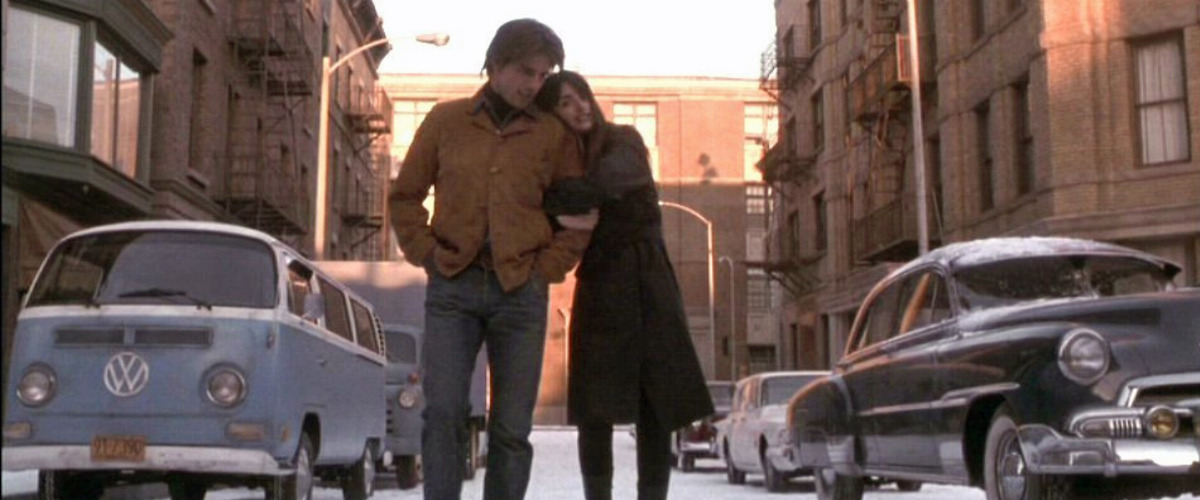
“Vanilla
Sky” (2001)”
Noting his
penchant for running in his movies, Amy Nicholson asks, “Does Tom Cruise
run? Does a fish swim?” The run that opens “Vanilla Sky” is
particularly unsettling.
The film—a remake of the Spanish horror film “Open Your
Eyes” (1997)—begins with a series of helicopter shots above Manhattan,
intercut with black screens that fragment our flow over the city. Radiohead’s
“Everything In Its Right Place” bubbles up on the soundtrack; as the
helicopter shots carry us to the Dakota apartment complex, and then into the
apartment of David Aames (Cruise), the music seems to be sourced from David’s
CD alarm clock. But even as he hits the alarm, the music continues (and Radiohead
wasn’t his wake-up call—it was the voice of a woman (sounding like Penelope
Cruz, who co-stars in both “Sky” and the original “Eyes” as
the same character) whispering, repeatedly: “Wake up”). The camera
passes by a flatscreen TV showing Audrey Hepburn in “Sabrina.”
David—hair tousled, a sleepy smile dancing on his lips—flips off the set,
which descends into the floor just as Thom Yorke sings the song’s opening
lines: “Everything…In its right place.” It’s a joke on both the mise-en-scene
of the set—everything in David’s life is perfectly laid out—and the film’s
star, as Cruise smiles in a mirror, and picks one stray, gray hair from his
head.
David leaves his apartment and drives his Ferrari through the
city, and it’s easy to imagine this as the start of any number of Tom Cruise
movies: the Lost Boy picaresque hero beginning his journey. But as David drives
across town, he begins to notice its emptiness—no pedestrians, no other cars
on the street. Cruise’s face is well-deployed here, his features becoming
unsettled by the gaps. It’s 9:05, his expensive watch tells him. Like a
protagonist in a “Twilight Zone” episode, he begins to wonder, where is
everybody?
David runs red lights, the only sounds the roar of his engine and
an odd buzzing, like a drunken bee has gotten trapped in the microphones. David
parks in the middle of Times Square. One of the world’s busiest intersections
is completely empty. David gets out, breathing heavily, and begins to stumble
across the road, as if he’s using his legs for the first time. He jogs, as the camera pulls up and captures
him against the neon. Cuts to medium close-ups of Cruise’s frantic face and
bouncing torso capture that quintessentially Cruisian gait, but the editing’s
rapidity—his body intercut with the Square’s signage, making Cruise just one
more marketable item—undercuts the running’s normally heroic purpose; in
combination with Mint Royale’s “From Rusholme With Love” on the
soundtrack, the effect is both crazed and kind of funny. David wakes up in a prone position on his
bed, and his actual day begins. Maybe.
“Vanilla Sky” is fascinating, and it’s grown to be my
favorite Crowe movie, in many ways because of its flawed ambitions rather than
in spite of them. It finds Crowe trying on different stylistic masks
(conspiracy thriller, science fiction film, New Wave romance) that never quite
fit, but transform our understanding of him. In a recent IMDb chat with fans, Crowe revealed, “I’d love to make
a third movie with Tom Cruise, we’ve talked about it for some time. It would be
the third in a trilogy of characters studies that began with ‘Jerry Maguire.’
” I’d love to see that film, but it’s hard to imagine it—”Vanilla
Sky” is a movie that literally deconstructs Cruise’s cinematic body,
pushing his persona into darkly comic repetitions that lay everything bare.
Where does one go after an empty Times Square?
“Vanilla Sky” has been described, not unfairly, as
incoherent. But what if coherence isn’t the point? On the DVD introduction,
Crowe refers to it as a set of clues, offering one way to read its
hyper-self-conscious use of film posters, movie clips, and star personae (to
say nothing of a rich soundtrack). Within the film, its show-offiness is of a
piece with David’s life of sensual opulence, thrusting us into it just before
it falls apart. But while every meta moment in “Sky”—from the
recreation in one shot of the cover to Bob Dylan’s “Freewheelin’ Bob
Dylan,” to the “Jules and Jim” poster on David’s wall, to
references to “To Kill A Mockingbird,” to the extended riff on The
Monkees’ “Head” which closes out the film—has a narrative
“justification,” each also comes loaded with baggage, threatening to
carry the viewer out of the picture and into his or her own memories and
personal “movies” about each item.
Crowe probably wouldn’t mind—he speaks in the DVD introduction
of “Open Your Eyes,” and being unable to shake its “folk
song” qualities—it was “partly a committed conversation you’d have
with someone late at night when big ideas float easily. I wanted to be a part
of that conversation.” The language is telling—folk songs,
conversations—markers of community which David’s wealth can’t give him. For a
remake, “Vanilla Sky” is surprisingly personal, a fractured
autobiography that’s less about Crowe’s actual life than the life he’d
“lived” through pop culture. And just as Crowe adds his own
“arrangement” to the earlier film via casting, song choices, etc., so
he invites the audience to add theirs (there’s a section on Crowe’s website,
The Uncool, that archives fan readings of the film’s mysteries, doing so with
geeky enthusiasm rather than distanced condescension).

“Elizabethtown”
(2005)
No wonder the follow-up, “Elizabethtown,” feels
exhausted. Midway through production, Ashton Kutcher was replaced by Orlando
Bloom. Susan Sarandon replaced Jane Fonda as Bloom’s mother. 18 minutes were
cut between the Toronto Film Festival and the film’s release, and it’s been
read as one of Crowe’s weaker films. Eventually, it inspired film critic Nathan
Rabin to coin the term “Manic Pixie Dream Girl” as a description for
the love interest played by Kirsten Dunst, a term which was quickly applied to
many millennial rom-com characters (Crowe himself took Rabin’s term with good
humor, saying, “I dig it … I keep thinking I’ll run into Nathan Rabin and
we’ll have a great conversation about it”).
“Elizabethtown” is earnest, has some nice performances
(Dunst’s character is certainly a type, but she performs it with wit), and a
gentle charm that makes you want to root for it. But there isn’t enough
incidental business to distract us from the story’s feeling like a “Jerry
Maguire” retread. Bloom is too nice for his role, as a hot-shot shoe
executive made suicidal by a business catastrophe, who travels to Kentucky for
his father’s funeral and must deal with a world he thought he’d left behind.
Bloom doesn’t have John Cusack’s quirk or Tom Cruise’s manic drive—there’s nothing
to draw us to him. Sarandon is so far out on a limb that one recalls Diane
Keaton’s line from “Annie Hall“—”Nice ham this year,
Mom“—and she throws the movie’s tone off.
Then, suddenly, the movie ditches the career angst and family
melodrama, and just hits the road: Dunst has provided Bloom with maps and mix
CDs for his cross-country trip, each song timed for his various arrivals. It’s
done with such music geek passion that the film comes alive, and you wish
this is where “Elizabethtown” had started.

“Almost
Famous” (2000)
Getting
his professional start at hometown underground paper the “San Diego
Door” at 13, Crowe was writing for “Rolling Stone” and
“Creem” by the time he was 15, turning in stories on bands like Led
Zeppelin and The Faces. These were often derided by the more cynical writers at
the magazine as puff pieces—Crowe, it was claimed, missed the depth a more
adversarial approach might elicit. Journalist Bill Flanagan later spent time hanging out on music tours
with Crowe, and noted, “I don’t know of any music critic who has inspired as
much petty jealousy as Cameron, or in whom such pettiness is absent.”
The
pettiness is also absent in this autobiographical film—if Crowe’s empathy
meant he’d never be the critic that his mentor Lester Bangs was, it serves him
well as a writer and director. From Crowe alter ego William (Patrick Fugit), to
the ambitious editors at “Stone,” to William’s rebellious sister
(Zooey Deschanel) and over-protective (but ultimately heroic) mother (Frances
McDormand), to the desperate groupies led by Penny Lane (Kate Hudson), to the
sniping egomaniacs in Stillwater (Billy Crudup and Jason Lee), it’s a pop music
“Rules of the Game,” where, as Octave says in that film, “The awful thing about life is this: Everybody has their reasons.”
It’s a
different French film we catch sight of in “Almost Famous,” as
William and his mother exit a theater showing “Stolen Kisses,” part
of Francois Truffaut’s “Antoine Doinel” series. The reference to
Truffaut’s alter ego keys us in to “Almost Famous”‘s connection to a
history of cinematic bildungsroman, and also to the melancholy spirit
beneath the slapstick humor and verbal play. As funny as the Doinel films often
are, there’s an underlying sadness in the character, the ways in which his
broken childhood shapes his intractability, and sabotages his opportunities.
Crowe’s
sensibility is more optimistic, but with his gawky social skills and stammering
around girls, there’s still a lot of Antoine in William. The movie doesn’t shy
away from the abusiveness of its protagonists’ actions, or the desperation
everyone feels to make something of themselves. It’s that sadness that gives
ballast to the “Tiny Dancer” sing-along on the bus: this is a moment
of communal grace amidst the storm, full of music fans hoping they don’t have
to grow up anytime soon.
